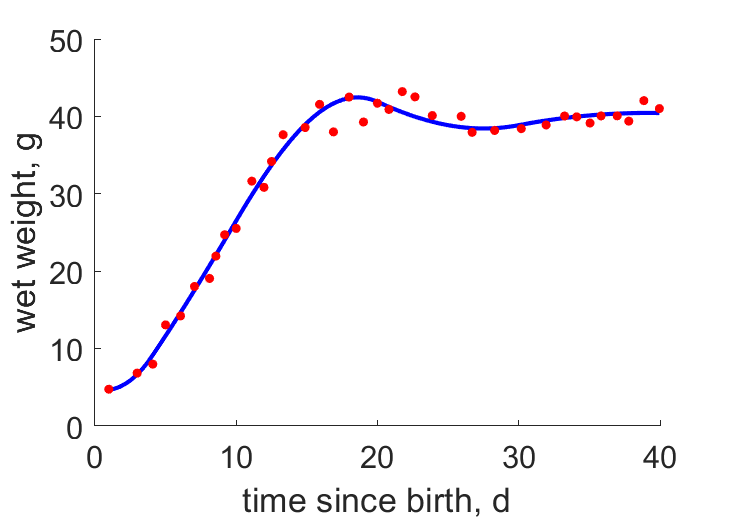Predictions & Data for this entry
| Model: std | climate: A, Csb, Cfa | migrate: Ml | phylum: |
| COMPLETE = 2.5 | ecozone: TN, THn | food: biCvf | class: |
| MRE = 0.013 | habitat: 0iFm, 0iMc | gender: Dg | order: |
| SMSE = 0.000 | embryo: Tnsfm | reprod: O | family: |
Zero-variate data
| Data | Observed | Predicted | (RE) | Unit | Description | Reference |
|---|---|---|---|---|---|---|
| ab | 21 | 21.24 | (0.01152) | d | age at birth | avibase |
| tx | 19.5 | 19.48 | (0.001059) | d | time since birth at fledging | avibase |
| tp | 58.5 | 58.16 | (0.005774) | d | time since birth at puberty | guess |
| tR | 547.5 | 547.5 | ( 0) | d | time since birth at 1st brood | avibase |
| am | 8796 | 8823 | (0.003009) | d | life span | AnAge |
| Wwb | 4.7 | 4.657 | (0.009085) | g | wet weight at birth | Faul2020 |
| Wwi | 46.9 | 48.47 | (0.03341) | g | ultimate wet weight | avibase |
| Ri | 0.005479 | 0.005455 | (0.004507) | #/d | maximum reprod rate | avibase |
Uni- and bivariate data
| Data | Figure | Independent variable | Dependent variable | (RE) | Reference |
|---|---|---|---|---|---|
| tW |  | time since birth | wet weight | (0.02974) | Faul2020 |
Pseudo-data at Tref = 20°C
| Data | Generalised animal | Sternula antillarum | Unit | Description |
|---|---|---|---|---|
| v | 0.02 | 0.03174 | cm/d | energy conductance |
| p_M | 18 | 418.9 | J/d.cm^3 | vol-spec som maint |
| k_J | 0.002 | 0.01717 | 1/d | maturity maint rate coefficient |
| k | 0.3 | 0.3001 | - | maintenance ratio |
| kap | 0.8 | 0.9715 | - | allocation fraction to soma |
| kap_G | 0.8 | 0.8001 | - | growth efficiency |
| kap_R | 0.95 | 0.95 | - | reproduction efficiency |
Discussion
- Body temperature is guessed
- Relative food intake reduced just after hatching
- mod_1: v is reduced
- mod_2: Pseudo-data point k is used, rather than k_J; Data set tp and parameter t_R are added, the latter replacing clutch interval t_N. Postnatal T is based on PrinPres1991, see get_T_Aves. See further the revision page, theme puberty
Bibliography